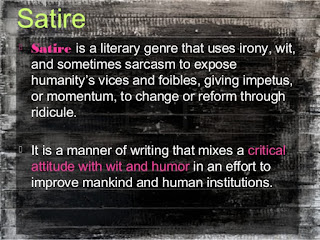Satire: Its styles, types and devices.
SATIRICAL STYLES
- Direct satire is directly stated
- Indirect satire is communicated through characters in a situation
TYPES OF SATIRE
There are two types of satire.
- Horatian: Horatian satire is tolerant, funny, sophisticated witty, wise, self-effacing and aims to correct through humor. Named for the Roman satirist from the Augustan period in Rome, Horace, this playfully criticizes some social vice through gentle, mild, and light-hearted humour. It directs wit, exaggeration, and self-deprecating humour toward what it identifies as folly, rather than evil. Horatian satire's sympathetic tone is common in modern society.
- Juvenalian: Juvenalian satire is angry, caustic, personal, relentless, bitter, and serious. Named after Augustan period’s Roman satirist Juvenal, this type of satire is more contemptuous and abrasive than the Horatian. Juvenalian satire provokes a darker kind of laughter; addresses social evil and points with contempt to the corruption of men and institutions through scorn, outrage, and savage ridicule. This form is often pessimistic, characterized by irony, sarcasm, moral indignation and personal invective, with less emphasis on humour.
- SATIRICAL DEVICE
- 1. Humor:Exaggeration or overstatement: Something that does happen, but is exaggerated to absurd lengths. This is the most common type of satire. For example, a caricature, the formalized walk of Charlie Chaplin.
- Understatement: A statement that seems incomplete or less than truthful given the facts. Think sarcasm with the intentions of evoking change. For example, Fielding’s description of a grossly fat and repulsively ugly Mrs. Slipslop: “She was not remarkably handsome.”
- Incongruity: A marked lack of correspondence or agreement.
- Deflation: the English professor mispronounces a word, the President slips and bangs his head leaving the helicopter, etc.
- Linguistic games / Malapropism: A deliberate mispronunciation of a name or term with the intent of poking fun; weird rhymes, etc.
- Surprise: Twist endings, unexpected events
The ability to recognize irony is one of the surest tests of intelligence and sophistication. Irony speaks words of praise to imply blame and words of blame to imply praise. Writer is using a tongue-in-cheek style. Irony is achieved through such techniques as hyperbole and understatement.
- Verbal Irony: Simply an inversion of meaning
- Dramatic Irony: When the words or acts of a character carry a meaning unperceived by himself but understood by the audience. The irony resides in the contrast between the meaning intended by the speaker and the added significance seen by others.
- Socratic Irony: Socrates pretended ignorance of a subject in order to draw knowledge out of his students by a question and answer device. Socratic irony is feigning ignorance to achieve some advantage over an opponent.
- Situational Irony: Depends on a discrepancy between purpose and results. Example: a practical joke that backfires is situational irony.
4. Mock Encomium: Praise which is only apparent and which suggests blame instead.
5. Grotesque: Creating a tension between laughter and horror or revulsion; the essence of all “sick humor: or “black humor”
6. Comic Juxtaposition: Linking together with no commentary items which normally do not go together; Pope’s line in Rape of the Lock: “Puffs, patches, bibles, and billet-doux”.
7. Mock Epic / Mock Heroic: Using elevated diction and devices from the epic or the heroic to deal with low or trivial subjects.
8. Parody: A mocking imitation, composition imitating or burlesquing another, usually serious, piece of work. Designed to ridicule in nonsensical fashion an original piece of work. Parody is in literature what the caricature and cartoon are in art.
9. Inflation: Taking a real-life situation and blowing it out of proportion to make it ridiculous and showcase its faults.
10. Diminution: Taking a real-life situation and reducing it to make it ridiculous and showcase its faults.
11. Absurdity: Something that seems like it would never happen, but could.
12. Wit or word play: The title The Importance of Being Earnest. It is a play on the word “earnest”, meaning honest, and the name “Earnest”.
13. Euphemism: The substitution of an inoffensive term for one that is offensive.
14. 1Travesty: Presents a serious (often religious) subject frivolously it reduces everything to its lowest level. “Trans”= over, across “vestire” = to clothe or dress. Presenting a subject in a dress intended for another type of subject.
15. Burlesque: Ridiculous exaggeration achieved through a variety of ways. For example, the sublime may be absurd, honest emotions may be turned to sentimentality. STYLE is the essential quality in burlesque. A style ordinarily dignified may be used for nonsensical matters, etc.
16. Farce: Exciting laughter through exaggerated, improbable situations. This usually contains low comedy: quarreling, fighting, coarse with, horseplay, noisy singing, boisterous conduct, trickery, clownishness, drunkenness, slap-stick.
17. Sarcasm: A sharply mocking or contemptuous remark. The term came from the Greek word “sarkazein” which means “to tear flesh.”
18. Knaves & Fools: In comedy there are no villains and no innocent victims. Instead, there are rogues (knaves) and suckers (fools). The knave exploits someone “asking for it”. When these two interact, comic satire results. When knaves & fools meet, they expose each other.
What is Satire?












































Good attempt .......
ReplyDeleteKeep on sharing .....